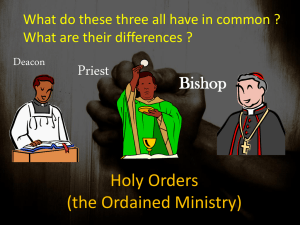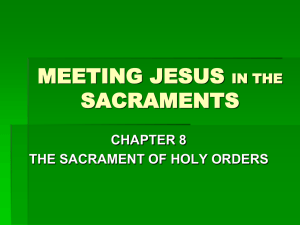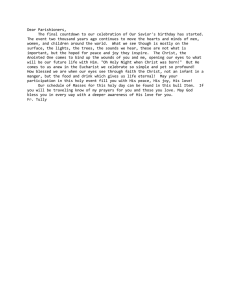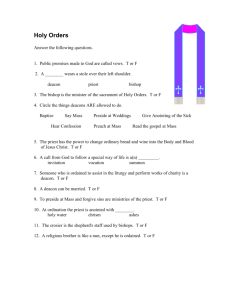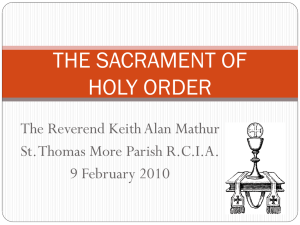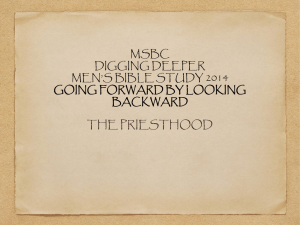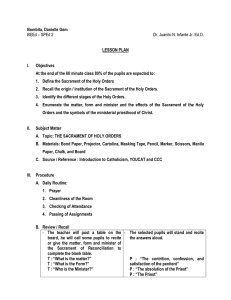Sacrament Holy Orders - Sacred Heart Catholic Church
advertisement
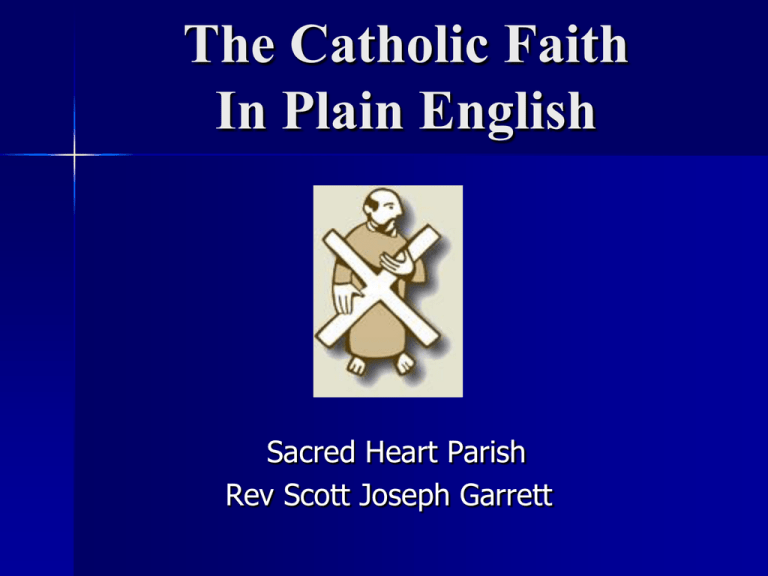
The Catholic Faith In Plain English Sacred Heart Parish Rev Scott Joseph Garrett Holy Orders Scripture & Holy Orders "Like Melchizedek you are a priest forever" (Psalm 110: 4). Scripture and Holy Orders Hebrews 5 contributes to a doctrine of priesthood. It connects Christ’s priesthood with his human nature. “Every high priest is taken from among men and made their representative before God, to offer gifts and sacrifices” (Hebrews 5:1). Melchizedek (Hebrews 7) is the most important connection to Holy Orders in the bible. Christ’s priesthood is compared to Melchizedek “It is even more obvious if another priest is raised up after the likeness of Melchizedek” (Hebrews 7: 15). What is Holy Orders? Holy Orders is the sacrament through which the mission entrusted by Christ to his apostles continues to be exercised in the Church until the end of time: thus it is the sacrament of apostolic ministry. It includes three degrees: episcopate, presbyterate, and diaconate (CCC 1536). Didache (Did a Kay) 150-160 Holy Orders The Didache: prophets and apostles have privileged positions in the community. Apostles should obey the gospel. Every apostle should be revered as the Lord True prophets are judged by moral conduct. When prophets get old, people support them Grace and Holy Orders The grace of the Holy Spirit proper to this sacrament is configuration to Christ as Priest, Teacher, and Pastor, of whom the ordained is made a minister (CCC 1585). Bishop (Episcopal) and Grace (CCC 1586) For the bishop, this is first of all a grace of strength. The grace to guide and defend his Church with strength and prudence as a father and pastor, with love for all and a preferential love for the poor, the sick, and the needy. This grace impels him to proclaim the Gospel to all, to be the model for his flock, to go before it on the way of sanctification by identifying himself in the Eucharist with Christ the priest and victim, not fearing to give his life for his sheep: Priest (Presbyteral) and Grace (CCC 1587) The spiritual gift conferred by presbyteral ordination is expressed by this prayer of the Byzantine Rite. The bishop, while laying on his hand, says among other things: Deaconate (Diakonia) and Grace (CCC 1588) With regard to deacons, strengthened by sacramental grace they are dedicated to the People of God, in conjunction with the bishop and his body of priests, in the service (diakonia) of the liturgy, of the Gospel, and of works of charity (Lumen Gentium 29). Common Priesthood The common priesthood of the faithful is exercised by the unfolding of baptismal grace…a life of faith, hope, and charity, a life according to the Spirit. Ministerial Priesthood The ministerial priesthood is at the service of the common priesthood. It is directed at the unfolding of the baptismal grace of all Christians. The ministerial priesthood is a means by which Christ unceasingly builds up and leads his Church. As a result we have the sacrament of Holy Orders. Synod of Elvira 305-306 (Early Canon 33) This contains the most ancient command of celibacy. There is also a mistake in the wording. The mistake says, “It is forbidden that the clergy should abstain from their wives.” Talks about bishops, priest, and deacons who are married and the fact they cannot have sex. Synod of Ancyra 314 (Early Canon 10) If deacons declare at the time of ordination that they must marry and cannot lead a celibate life, it is OK. If they do not make this declaration and have agreed to holy orders, then they must remain celibate. Synod Of Neocaesarea 314-325 If a priest marries, he will be removed from the ranks of clergy. If he commits fornication or adultery, he shall be excommunicated. No one is ordained priest before he is thirty years old, Jesus was 30. Council of Nicaea 325 (Early Canon 3, 9, 10) Bishop or priests are forbidden to have in their house a women living their, except ones mother or immediate family. Ordination of priests is invalid if the person did not confess crimes before being ordained and if he committed certain serious crimes then his priesthood is invalid. For example crimes such as blasphemy, bigamy, heresy, idolatry, magic, etc. Sacred Functions of Priest Priest, Prophet, and King Priesthood is Christ as Prophet (the word of God) (Teaching) Priesthood is Christ as Priest (purification of sin) (Sanctifying) Priesthood is Christ as King (leadership) (Governing) Saint Thomas Aquinas Back in Time Philosopher, theologian, doctor of the Church, patron of Catholic universities, colleges, and schools. Born at Rocca Secca in the Kingdom of Naples, 1225 or 1227; died at Fossa Nuova, 7 March, 1274. Much of this thought has evolved into what Holy Orders is today. Aquinas: Question 34 The Sacrament of Orders Matter: the sacrament is bestowed by the imposing of the bishop’s hands. Form: a prescribed prayer, which constitutes it as a sacrament. Aquinas: Question 36 Qualities of the Ordained The recipient of orders must lead others and be a holy man of exemplary life. The candidate should have knowledge of sacred duties, i.e., scriptures, morality, etc. A bishop who knowingly ordains a candidate who is unworthy commits a grave sin A man who exercises his office while in a state of mortal sin is guilty of another grievous sin every time he performs a sacred function. Aquinas: Distinction of Orders The distinction of orders is derived basically from their varying reference to the Holy Eucharist. There are seven distinctions: There is Priest, who offers the Eucharistic Sacrifice, deacon (assists priest), subdeacon (attends to the sacred vessels used for eucharist), acolyte (who readies bread and wine), the exorcist (expels evil spirits), the lector (imparts sacred instruction), the porter (welcomes and protects). Holy Orders Code of Canon Law 1983 By divine institution, the sacrament of orders establishes some among the Christian faithful as sacred ministers through an indelible character which marks them. They are consecrated and designated to nourish the people of God, fulfilling in the person of Christ the Head the functions of teaching, sanctifying, and governing (Canon 1008). Ordination Celebration & Minister Celebrated Sunday or holy day (C. 1010). Celebrated in the cathedral; for pastoral reasons it can be celebrated in another church or oratory. The faithful must be invited so that as large an assembly as possible is present. The minister is a bishop (Canon 1012). Requirements For Ordination Priesthood - Canons 1026-1032 Cannot be forced and have integral faith Must be rightly motivated Must have required knowledge Must possess a good reputation Must have integral morals, proven virtues Must have physical and psychic qualities Must have take part in pastoral care Must be active six months as transitional deacon Must have philosophy and theology degree. Priesthood: 25 year old Male Requirements for Ordination Permanent Deacons Unmarried Permanent Deacon: 25 years old Married Permanent Deacon: 35 years old Permanent deacon: Complete formation process Prerequisites for Permanent or Transitional Deaconate Sacrament of Confirmation Enrolled in writing by own hand Must be a Lector and Acolyte Signed agreement: I freely want it. Signed agreement: I am devoted Public declaration of celibacy Spiritual five day retreat Impediments: Can never receive (Canons 1040-1049) Amentia, psychic illness, mental illness Has committed apostasy, heresy, or schism Has attempted marriage illegally Has committed voluntary homicide Has procured or cooperated in an abortion Has gravely mutilated himself or another Has attempted suicide Is prohibited by some penalty of canon law Impediments: Temporarily Impeded A man who has a wife: unless Permanent Deacon a person having an office forbidden to clerics, i.e. political office. A neophyte (a recent convert) Christian faithful aware of impediments to sacred orders are obliged to reveal them to the bishop before ordination. Women Ordination Why Not? During the Sacraments, the priest acts in the Person of Christ. Christ was a Man. Infallibility: Traditionally all popes have been Men. The Pope couldn’t change this even if he wanted to. Father Justin
